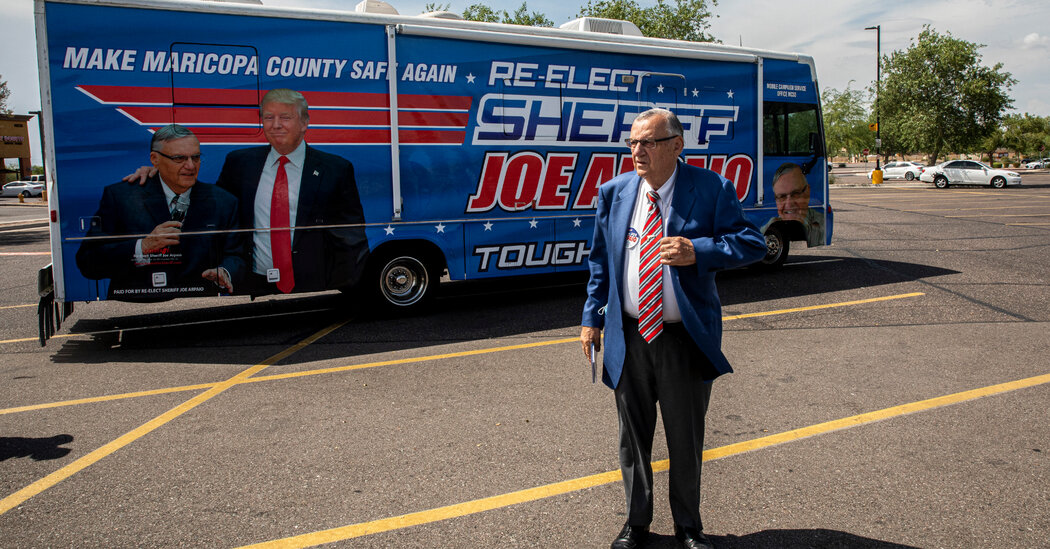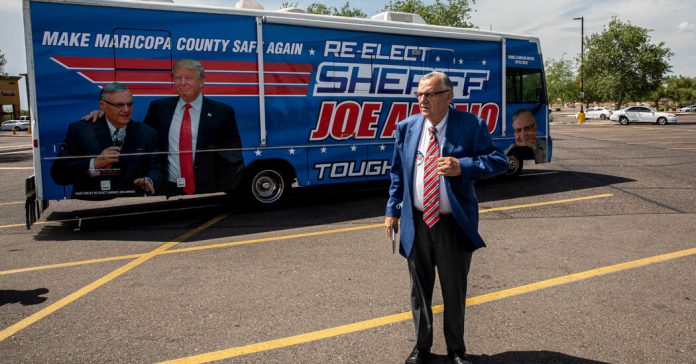
PHOENIX — After 24 years of doling out his punitive brand of justice in Arizona’s most populous county, Joe Arpaio, who billed himself as “America’s toughest sheriff,” suffered a landslide defeat in 2016, largely because of his hard-line immigration stances and his own pugnacious defiance, which earned him a criminal conviction for contempt of court.
Now he’s trying to win back his old job.
Mr. Arpaio faces his first test in the Republican primary election on Tuesday, when he must survive a three-way race that includes a challenge from his former chief deputy, Jerry Sheridan.
Few in the state believe Mr. Arpaio, 88, can mount a successful comeback and win in November, saying that he’s too old, too out of touch or too politically damaged to run a credible campaign in 2020.
There are signs that Mr. Arpaio, a former kingmaker in Republican circles, may not even survive the primary. Nearly 80 percent of Arizonans cast their ballots early by mail, and a recent poll of Republicans who had already voted showed Mr. Arpaio and Mr. Sheridan statistically tied.
Still, strategists and political operatives are monitoring Mr. Arpaio’s fate for signs of the broader implications for Arizona politics. The former sheriff had closely aligned himself with President Trump on immigration, earning the president’s praise. The two men are stylistic doppelgängers who vilify undocumented immigrants and are pushing a strident law-and-order message amid a nationwide movement to stop police abuses against people of color.
When Mr. Trump issued the first pardon of his presidency, in August 2017, it went to Mr. Arpaio.
Mr. Arpaio’s falling star among Republicans in the vast suburbs of Maricopa County, which includes Phoenix and surrounding communities, signals not only his fading appeal. It’s also a sign of Mr. Trump’s downward arc in a state that has long leaned conservative but is now considered a critical up-for-grabs presidential battleground.
Recent polls show Joseph R. Biden Jr. holding a slight edge over Mr. Trump, who won the state by 3.5 percentage points in 2016. A New York Times/Siena College poll in June found Mr. Biden ahead of the president by seven percentage points.
“If you want to track the trajectory of Trumpism, you should study Arizona circa 2006 to about 2016,” said Kirk Adams, a Republican former speaker of the Arizona House and former chief of staff to Gov. Doug Ducey. “Arizona was the precursor.”
Democrats know Mr. Arpaio’s popularity has slipped among Republicans and independents, and are eager to leverage Mr. Trump’s fondness for him as a way to bludgeon the president. Tom Perez, the chairman of the Democratic National Committee, told reporters on a conference call in late June that national Democrats would “leave no ZIP code behind” to flip the newly minted battleground state.
“If the voters in Arizona want to know the difference between Donald Trump and Joe Biden, look no further than Joe Arpaio,” Mr. Perez said. “The Obama-Biden administration prosecuted Joe Arpaio. Donald Trump pardoned Joe Arpaio.”
The president is flagging in Arizona polls largely because he has alienated suburban Republicans and independent voters, the same ones who drove a spike into the heart of Mr. Arpaio’s political career.
Mr. Trump’s slump in the polls is firmly tethered to the coronavirus, while the most potent attack on Mr. Arpaio among suburban voters is the millions in taxpayer dollars spent on legal settlements largely related to the harsh conditions in his jails and his immigration-related policing.
But the broad strokes of their problems are the same.
“People are tired of the drama,” Mr. Adams said. “They’re just flat-out fatigued from the daily reality TV show. Those people are prime Biden voters. And as they go, so goes Maricopa County and so goes the state.”
Mr. Trump’s pull in Arizona, a traditionally conservative state where anti-immigrant sentiment is prevalent, remains strong. The state’s quickly changing demographics give Democrats hope they can flip the state, but that will depend on strong Latino turnout as well as independents and moderate Republicans being sufficiently motivated to vote the president out. Those swing voters could come back into the fold for Mr. Trump if the coronavirus becomes a slightly lesser focus in the race.
Barrett Marson, a Republican political consultant, said that while Mr. Arpaio was unlikely to win his old job back, it was less clear if the same independent voters who soured on him have hit that point with the president.
“The fates of those two are linked — not tied together — but linked,” he said. “If you’re put off by one, you’re certainly put off by the other.”
A decade ago, brashly charismatic populist personalities like Mr. Arpaio and former Gov. Jan Brewer, also a Republican, dominated Arizona’s political landscape, as did the issue of immigration. But Arizona today is a more image-focused state, better exemplified by Mr. Ducey, a Republican who has tried to repair the state’s reputation as an intolerant desert backwoods, as well as its relationship with Mexico.
But for many people around the world, Arizona is still synonymous with “Sheriff Joe,” the outrageous lawman who once boasted that he was “honored” to be compared to the Ku Klux Klan.
It’s not the image local political and business leaders want.
Sharon Harper, a developer and member of Greater Phoenix Leadership, a group of mostly Republican political influencers, was the chair of Mr. Ducey’s re-election campaign in 2018 but is crossing the aisle in the Maricopa County sheriff’s race to support the Democratic incumbent, Paul Penzone, a centrist former Phoenix police sergeant with a deliberately understated style.
“I don’t really think of it so much as supporting a Democrat as much as I think about wanting to stand against bigotry, racism and the divisiveness that I attribute to Arpaio when he was in that office,” she said.
Mr. Ducey, who in 2014 earned Mr. Arpaio’s then-coveted endorsement, has not endorsed Mr. Arpaio or Mr. Penzone.
On the campaign trail, Mr. Arpaio travels the county in his mobile headquarters, a gaudy 33-foot motor home covered with images of him and the president. He presses palms like it’s 2019. He dons a face mask, but only occasionally.
When the motor home pulled into a Walmart parking lot one recent morning in Scottsdale, a small crowd gathered to gawk at the spectacle. Mr. Arpaio still has loyalists.
“You’re a legend in New York,” Todd Hall, 42, a former New Yorker, said as he loaded groceries into his car. “Hell yeah, I’ll vote for you.”
Though Arizona’s demographics are trending more Democratic, Mr. Arpaio has not changed.
He promises that if he’s elected again, he’ll employ the same tactics, some of them illegal, that he used to. If he wins, one of his first priorities would be to reopen his Tent City jail, an outdoor detention facility in the scorching desert that was subject to several lawsuits.
“I wanted to come back, not because I lost, but because there were so many things that disappeared after I left,” he said in an interview. “The tents went down, everything went down. If there’s any time in history for a sheriff like me to get back, it’s now, with all the chaos.”
Mr. Penzone, who is unchallenged in the Democratic primary, spent his first four years in office trying to unravel Mr. Arpaio’s legacy, ending the practice of forcing male inmates to wear pink underwear and shuttering Tent City — which now houses a drug recovery program.
Regaining the trust that Mr. Arpaio eroded with the Latino community, and repairing the department’s image, is a continuing project. Mr. Penzone has fired, demoted and disciplined deputies accused of biased policing.
But the same Latino community groups and activists who drove Mr. Arpaio’s defeat say that while Mr. Penzone has put a friendlier face on the department, he hasn’t done enough to address systemic racism.
Mr. Penzone ended Mr. Arpaio’s practice of holding inmates suspected of being in the country illegally for extended periods on behalf of federal immigration authorities. But he has left intact the sheriff’s office’s agreement to work with U.S. Immigration and Customs Enforcement in county jails.
Carlos Garcia, a Phoenix City Council member and former executive director of Puente Human Rights Movement, said this policy put undocumented people in danger of deportation for even minor infractions. Mr. Garcia worked to elect Mr. Penzone, but said he now had his doubts.
“I think in the yearning to get rid of Arpaio, we failed to really understand who Paul Penzone was,” Mr. Garcia said. “I don’t know if ‘disappointed’ is enough. He’s done absolutely nothing except close Tent City, and he did that for other reasons, not for the reasons it should have been shut down. Unfortunately, Arpaio’s culture remains.”
Mr. Penzone acknowledged that his office had not rooted out all of its problems, but said he was working to address concerns about mistreatment of inmates and biased policing.
“What you’re seeing is an organizational change that’s not going to happen overnight,” he said in an interview. “You can’t have 3,500 employees and root out all the bad ones overnight when they had 24 years of previous leadership. But to say that what went on under that guy is going on under this guy is just dishonest.”
Mr. Penzone’s campaign finance reports read like an invitation list to a Chamber of Commerce gala.
His top donors include the Arizona Diamondbacks’ owner, Earl Kendrick, and his wife, Randy, as well as the Arizona Cardinals’ owner, Michael Bidwill. Barry Goldwater Jr., a son of the famous Arizona conservative Barry Goldwater, and Andrew McCain, a son of former Senator John McCain, are also donors.
It’s a fact that Mr. Arpaio is keenly aware of as he ticks off a list of Republican donors to his Democratic opponent’s campaign, noting that the common thread is that they are allies of Mr. Ducey and Mr. McCain.
“They don’t care about public safety — they only care about their reputations and how much beer they can sell and how much business they’re losing. And they don’t like the reputation I’m giving to this area?” he said. “They fear me. They know I’m going to come back and do the job.”
The post How Joe Arpaio’s Fate in Arizona Could Be a Window Into Trump’s appeared first on New York Times.







